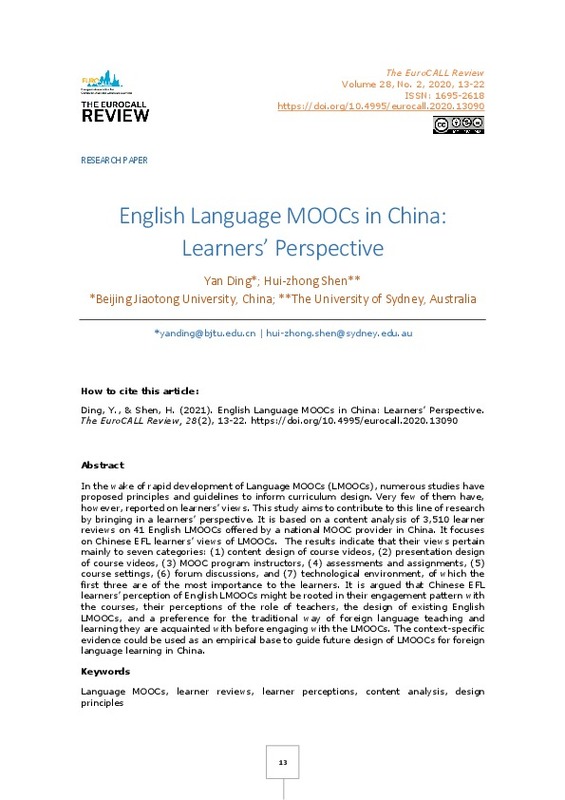Bárcena, E., & Martín-Monje, E. (2014). Introduction. Language MOOCs: an emerging field. In E. Martin-Monje. & E. Bárcena. (Eds.), Language MOOCs: Providing learning, transcending boundaries (pp.1-15). Berlin: Walter de Gruyter. https://doi.org/10.2478/9783110420067.1
Beirne, E., Mhichíl, M. N. G., & Cleircín, G. (2017). LMOOCs, classifying design: survey findings from LMOOC providers. In K. Borthwick, L. Bradley, & S. Thouësny. (Eds.), CALL in a climate of change: Adapting to turbulent global conditions-Short papers from EUROCALL 2017 (pp.30-34). Research-publishing.net. https://doi.org/10.14705/rpnet.2017.eurocall2017.684
Breslow, L., Pritchard, D. E., de Boer, J., Stump, G. S., Ho, A. D., & Seaton, D. T. (2013). Studying learning in the worldwide classroom: Research into edX's first MOOC. Research and Practice in Assessment, 8(1), 13-25.
[+]
Bárcena, E., & Martín-Monje, E. (2014). Introduction. Language MOOCs: an emerging field. In E. Martin-Monje. & E. Bárcena. (Eds.), Language MOOCs: Providing learning, transcending boundaries (pp.1-15). Berlin: Walter de Gruyter. https://doi.org/10.2478/9783110420067.1
Beirne, E., Mhichíl, M. N. G., & Cleircín, G. (2017). LMOOCs, classifying design: survey findings from LMOOC providers. In K. Borthwick, L. Bradley, & S. Thouësny. (Eds.), CALL in a climate of change: Adapting to turbulent global conditions-Short papers from EUROCALL 2017 (pp.30-34). Research-publishing.net. https://doi.org/10.14705/rpnet.2017.eurocall2017.684
Breslow, L., Pritchard, D. E., de Boer, J., Stump, G. S., Ho, A. D., & Seaton, D. T. (2013). Studying learning in the worldwide classroom: Research into edX's first MOOC. Research and Practice in Assessment, 8(1), 13-25.
Cai, J. G. (2017). Challenges of foreign language teaching in colleges: Analysis of Guidelines on College English Teaching. Foreign Language Teaching, 38(1), 6-10.
Carlos, A. M. F., Verónica, E. C. R., & Guerrero, J. S. (2017). BLMOOCs, a proposal for the design of language MOOCs in a blended context. In L. Terán. & A. Meier. (Eds.), Proceedings of the fourth international conference on edemocracy and egovernment (pp. 265-268). IEEE.
Colpaert, J. (2014). Reflections on present and future: towards an ontological approach to LMOOCs. In E. Martin-Monje. & E. Bárcena. (Eds.), Language MOOCs: Providing learning, transcending boundaries (pp. 161-172). Berlin: Walter de Gruyter.
Ding, Y. (2019). What constitutes an effective instructional video: Perspectives from Chinese EFL learners. In B. Zou & T. Michael. (Eds.), Recent developments in technology-enhanced and computer-assisted language learning (pp.236-256). Hershey, PA: IGI Global. https://doi.org/10.4018/978-1-7998-1282-1.ch011
Drake, J. R., O'Hara, M., Seeman, E. (2015). Five principles for MOOC design: With a case study. Journal of Information Technology Education: Innovations in Practice, 14, 125-143. https://doi.org/10.28945/2250
Elo, S., & Kyngäs, H. (2008). The qualitative content analysis process. Journal of Advanced Nursing, 62, 107-115. https://doi.org/10.1111/j.1365-2648.2007.04569.x
Fontana, M., & Leffa, V. (2018). MOOCs for language teaching: A study on CALL from the connectivist perspective. Alfa: Revista de Linguistica, 62(1), 73-86. https://doi.org/10.1590/1981-5794-1804-4
Gimeno-Sanz, A. (2017). Designing a MOOC for learners of Spanish: exploring learner usage and satisfaction. In K. Borthwick, L. Bradley & S. Thouësny. (Eds.), CALL in a climate of change: Adapting to turbulent global conditions-Short papers from EUROCALL 2017 (pp.122-127). Research-publishing.net. https://doi.org/10.14705/rpnet.2017.eurocall2017.700
Hew, F. K. (2016). Promoting engagement in online courses: what strategies can we learn from three highly rated MOOCs. British Journal of Educational Technology, 47(2), 320-341. https://doi.org/10.1111/bjet.12235
Ho, J., & Crookall, D. (1995). Breaking with Chinese cultural traditions: Learner autonomy in English language teaching. System, 23(2), 235-243. https://doi.org/10.1016/0346-251X(95)00011-8
Khalil, M., Brunner, H., & Ebner, M. (2015). Evaluation grid for xMOOCs. International Journal of Emerging Technologies in Learning, 10(4), 40-45. https://doi.org/10.3991/ijet.v10i4.4653
Han, Y. (2019). Reflections on the MOOCs construction in China and applicability of MOOCs in foreign language courses. Technology Enhanced Foreign Languages, 189, 34-38.
Luo, R. (2017). Modes of autonomous foreign language learning in the Internet environment-A survey of language MOOCs in Chinese and American MOOC platforms. Foreign Language World, 6, 29-36.
Luo, S. (2016). Autonomous foreign language learning model under MOOCs environment. Modern Educational Technology, 1, 87-93.
Martín-Monje, E., Castrillo, M. D., & Mañana-Rodríguez, J. (2018). Understanding online interaction in language MOOCs through learning analytics. Computer Assisted Language Learning, 31(3), 251-272. https://doi.org/10.1080/09588221.2017.1378237
Peng, X., & Xu, Q. (2020). Investigating learners' behaviors and discourse content in MOOC course reviews. Computer and Education, 143, 1-14. https://doi.org/10.1016/j.compedu.2019.103673
Perifanou, M. (2016). Designing strategies for an efficient language MOOC. In S. Papadima-Sophocleous, L. Bradley & S. Thouësny. (eds.), CALL communities and culture - short papers from EUROCALL 2016 (pp. 380-385). Research-publishing.net. https://doi.org/10.14705/rpnet.2016.eurocall2016.592
Read, T. (2014). The architectonics of language MOOCs? In E. Martin-Monje & E. Bárcena. (Eds.), Language MOOCs: Providing learning, transcending boundaries (pp. 91-105). Berlin: Walter de Gruyter.
Scollon, R., & Scollon, S. (1994). The post Confucian confusion. Research Report No. 37. Department of English, City Polytechnic of Hong Kong.
Shen. H., Yuan, Y., & Ewing, R. (2014). English learning websites and digital resources from the perspective of Chinese university EFL practitioners. ReCALL, 27(2), 156-176. https://doi.org/10.1017/S0958344014000263
Sokolik, M. (2014). What constitutes an effective language MOOC? In E. Martin-Monje & E. Bárcena. (Eds.), Language MOOCs: Providing learning, transcending boundaries (pp. 16-32). Berlin: Walter de Gruyter.
Teixeira, A. M., & Mota, J. (2014). A proposal for the methodological design of collaborative language MOOCs. In E. Martin-Monje & E. Bárcena. (Eds.), Language MOOCs: Providing learning, transcending boundaries (pp. 33-47). Berlin: Walter de Gruyter.
Wang-Szilas, J., & Bellassen, J. (2017). Dualism-based design of the Introductory Chinese MOOC 'Kit de contact en langue chinoise'. In K. Qian & S. Bax. (Eds.), Beyond the language classroom: Researching MOOCs and other innovations (pp. 43-58). Research-publishing.net. https://doi.org/10.14705/rpnet.2017.mooc2016.670
Zhong, Y., & Shen, H. (2002). Where is the technology-induced pedagogy? Snapshots from two multimedia EFL classrooms. British Journal of Educational Technology, 33(1), 39-52. https://doi.org/10.1111/1467-8535.00237
[-]









